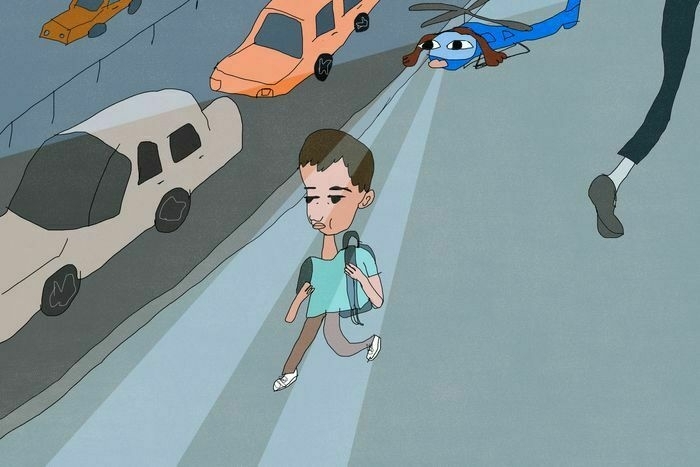Cosplaying adulthood
I discovered this article published at The Cut while browsing Hacker News. I was immediately drawn to it, because one of the main examples it uses is ‘cosplaying’ adulthood while at kids' sporting events.
There’s a few things to say about this, in my experience. The first is that status tends to be conferred by how good your kid is, no matter what your personality. Over and above that, personal traits — such as how funny you are — make a difference, as does how committed and logistically organised you are. And if you can’t manage that, you can always display appropriate wealth (sports kit, the car you drive). Crack all of this, and congrats! You’ve performed adulthood well.
I’m only being slightly facetious. The reason I can crack a wry smile is because it’s true, but also I don’t care that much because I’ve been through therapy. Knowing that it’s all a performance is very different to acting like any of it is important.

It’s impressive how much parents’ beliefs can seep in, especially the weird ones. As an adult, I’ve found myself often feeling out of place around my fellow parents, because parenthood, as it turns out, is a social environment where people usually want to model conventional behavior. While feeling like an interloper among the grown-ups might have felt hip and righteous in my dad’s day, it makes me feel like a tool. It does not make me feel like a “cool mom.” In the privacy of my own home, I’ve got plenty of competence, but once I’m around other parents — in particular, ones who have a take-charge attitude — I often feel as inept as a wayward teen.Source: Adulthood Is a Mirage | The CutThe places I most reliably feel this way include: my kids’ sporting events (the other parents all seem to know each other, and they have such good sideline setups, whereas I am always sitting cross-legged on the ground absentmindedly offering my children water out of an old Sodastream bottle and toting their gear in a filthy, too-small canvas tote), parent-teacher meetings, and picking up my kids from their friends’ suburban houses with finished basements.
I’ve always assumed this was a problem unique to people who came from unconventional families, who never learned the finer points of blending in. But I’m beginning to wonder if everyone feels this way and that “the straight world,” or adulthood, as we call it nowadays, is in fact a total mirage. If we’re all cosplaying adulthood, who and where are the real adults?
The laziness of helicopter parenting
This article in The Cut by Kathryn Jezer-Morton is fantastic. There’s a tension in parenting between, on the one hand, giving your kids space to grow, be themselves, and make mistakes — and, on the other, looking out for them, being time-efficient, and avoiding the opprobrium of other parents.
As my kids get older, I am learning how labor-intensive it is to teach them to be independent, and I’m beginning to think that we have the helicopter-parent/hands-off-parent binary all wrong. Maybe helicopter parenting is a form of neglect, one that might even be comparable in its harmfulness to the kind of neglect that forces kids to grow up by their own wits. The crisis of teen mental health in the wake of COVID can be explained in all sorts of ways, but a common denominator is that many teenagers feel that they have no control over their lives, which is distressing for any human. When you teach a kid to be safely independent, you give them some of that control. Denying a kid that opportunity is cruelty disguised as parental virtue – it’s beyond fucked up and dark, when you really think about it.Source: Are Helicopter Parents Actually Lazy? | The CutI also wonder if we misunderstand some of the motivations for helicopter parenting. We assume it’s an anxiety response, and I’m sure that explains a lot of it, but it’s also the path of least resistance.
[…]
“Parents who are very involved, wanting to know what their child is doing in the world — that is often considered part of helicopter parenting, but that isn’t necessarily a problem,” said [Dr. Gail Saltz, clinical associate professor of psychiatry at New York-Presbyterian Hospital and host of the How Can I Help? podcast from iHeartRadio]. “Being involved is distinct from wanting to help a child make all of their decisions. The problem is ‘I will help you do all the things. I will get involved in your conflicts. I will not let you make any mistakes.’” According to Saltz, even parents of young children should avoid approaching parenting as a troubleshooting exercise. Children become accustomed to this degree of parental involvement. The more time parents spend clearing the path for their offspring, the harder it is for children to adapt to facing obstacles on their own.
[...]
Helicopter parenting is also a way of protecting yourself from the judgment of other parents. In fact, its specter can loom even larger than actual threats to children’s safety. The off-piste vigilance of strangers can make an otherwise safe, ordinary situation spiral into conflict and defensiveness.
[...]
It doesn’t take only energy and attention to teach your kids to navigate independence safely. It takes a certain willingness to accept that someone out there might think you’re a bad parent. Allowing imagined judgment to cloud our decision making is like letting an internet comments section make our choices for us. Helicopter parenting is the manifestation of overlapping anxieties about the hazards of the world and about the opinions of other people. It’s also a product of the narcissistic delusion that our children’s (inevitable, developmentally necessary) failures are our own.
Illustration: Hannah Buckman
Tolerating uncertainty
Although claims about the ‘unprecedented’ times we live in can be overblown, I think it’s reasonable to state that we exist in an uncertain world.
This article by Kristin Wong in The Cut talks about the importance of being able to tolerate uncertainty, as this “improves our decisions, promotes empathy, and boosts creativity,” — according to Jamie Holmes, a Future Tense Fellow at New America and author of the book, Nonsense: The Power of Not Knowing.
Uncertainty can create cognitive dissonance, the discomfort of holding two contradictory thoughts, opinions, or beliefs. Ironically, though, not being able to deal with uncertainty can be equally distressing. An intolerance of uncertainty is linked to anxiety and depression. So how do you get better at tolerating it?The article suggests that you start off with a quiz to ascertain your tolerance to ambiguity and uncertainty. However, life is short, so I'd skip that and move onto the meat of the article.
We’re better or worse at tolerating uncertainty and ambiguity in different situations. It’s not like we have a single emotional gear.
There are certain times you might be extra susceptible to certainty, Holmes suggests. “Our need for closure is heightened when we’re rushed, bored, tired, or tipsy,” he said. So when you’re feeling any of those things, or maybe all of them, be aware that you might be prone to cognitive closure at that time.
Your desire for certainty probably also varies depending on the situation. You might be anxious over your bank account, for instance, but you don’t really care how you did on your performance review. Pinpoint these concerns, then avoid what Michel Dugas, a professor of psychology at the University of Quebec in Outaouais, calls “certainty seeking behavior.”
In order to improve our relationship with uncertainty, we need to get our of our comfort zone, and out of our heads.
I've actually read Holmes' book. I'm not sure whether it's because I'm a Philosophy graduate who's already done some work on ambiguity, but I found it underwhelming. It is worth, however, thinking about ways in which we can all deal with uncertainty.“Two ways to get comfortable with uncertainty, perhaps surprisingly, are reading fiction and multicultural experiences,” Holmes says. “Make reading short stories or novels a habit. Likely because it invites us inside the worlds and minds of characters unlike ourselves, fiction makes ‘otherness’ less threatening.” He adds that both fiction and multicultural experiences not only lower our need for closure and help us make better decisions, but they also make us more empathetic. Research, like this 2010 study, shows that multicultural experiences fuel creativity, too.
Travel, reading, learning a new language, experiencing another culture — these all present new experiences to your brain, which force you outside of your comfort zone in rewarding ways. Also: They are fun. Sounds like a pretty certain win-win.
Source: The Cut (via Stowe Boyd)
